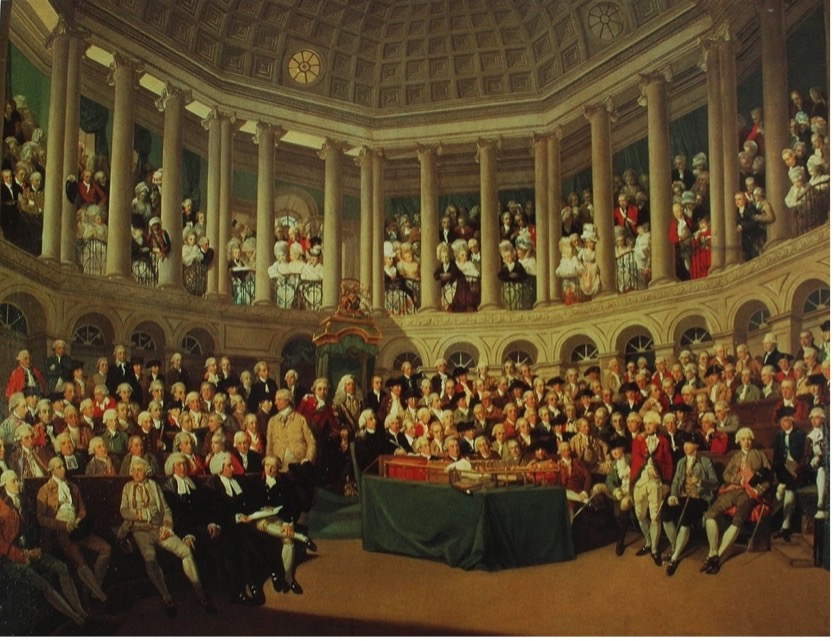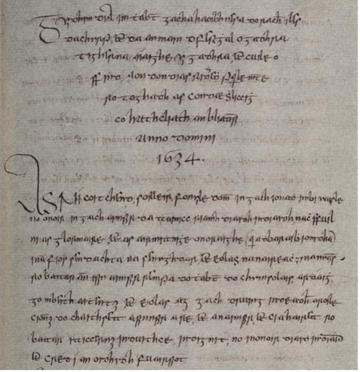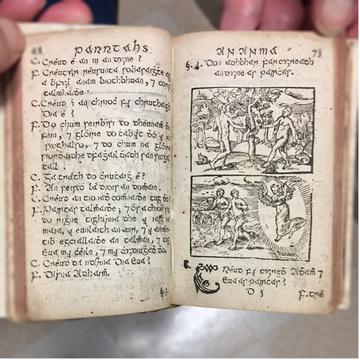Parliament and Parliaments from the Gaelic Perspective
Is there a story of Parliament to be told from the Irish Gaelic perspective in the early modern period? That no one to date has attempted the telling suggests not. Perhaps that silence should not surprise. The parliament in Ireland was an instrument of empire established in the wake of the twelfth-century Anglo-Norman invasion and wielded in the interest of a settler colonial population. Metropolitan efforts to curb its independence were always about intra-English conflict in any case and done with little regard for, or representation from, Gaelic Ireland. Consider Poynings’ Law (1494), that notorious mechanism devised under Henry VII by which legislative efforts of the Irish assembly had to be blessed by King and Council before ratification: this was not a response to rumblings of Irish self-determination but rather done to preclude an English subject using the assembly to thwart crown interests, as Richard Duke of York had done during the Wars of Roses. At the other end of our period looms the Declaratory Act (1720) which, by establishing that the British Parliament could legislate for Ireland, landed on the Irish assembly like the cartoon foot from the opening credits of Monty Python’s Flying Circus. Here again, however, was an imperial flex prompted not by indigenous Irish resistance to the crown but rather by the Penal Laws, a series of punitive measures enacted by a Protestant colonial elite to counter perceived inaction by the crown in humbling the Catholic majority. Even the grim Statutes of Kilkenny (1366), routinely held up as a proto-racialist act of apartheid for its condemnation of Gaelic language and cultural forms, was less about oppression based on ethnicity than about stemming the tide of cultural assimilation on the part of the settler community. To borrow an unfortunate if apt phrase from current American political discourse, the Irish Parliament was very much “England First” in its worldview and practice. Thus, as the historiography on Irish institutions and the state grows in size and sophistication, it perhaps is little surprise that a Gaelic perspective is lacking: there simply may be no tale to tell.

A more modern, but evocative, image of the Irish Parliament: Francis Wheatley’s depiction of The House of Commons in Session, 1780.
Then again, this historiographical silence might be more a product of method and approach. If we are curious about Gaelic views of representative assemblies, then it is to the vernacular sources we must appeal. Few do so, however, which is particularly unfortunate given that the archive of Early Modern Irish – the iteration of the written language c. 1200-1650 – is voluminous and populated by a broad range of forms and genres including court poetry, histories, annals, placename lore, genealogies, grammars, devotional and religious works, legal and medical tracts, myths, satires, romances and so on.

This selection from the Annála Ríoghdhachta Éireann (Annals of the Four Masters) gives a sense for Irish prose works in manuscript from the period: Start of dedication to the work’s patron, Ferghal Ó Gadhra. University College Dublin, LS A 13, f. xix.
In fairness to the scholarly community, acquisition of Early Modern Irish has always been difficult. Few institutions offered instruction and, unlike for Old and Modern Irish, there existed no dedicated learning materials for self-starters: no grammar, no dictionary, no guide. But as such resources become more available, and access to manuscripts and printed transcriptions more widespread, surely we can allow ourselves to imagine that within that body of writing there is to be found commentary on Parliament, specifically, and deliberative institutions, generally.
What better place to start that inquiry than with comparison of three well-known prosimetric works of the seventeenth century whose very titles make reference to parliament? The earliest of these, an anonymous satire known as Pairlement Chloinne Tomáis (The Parliament of Clan Thomas) likely composed between 1605-15, lampoons the pretensions of Gaelic social climbers in the wake of the Nine Years’ War (1594-1603). Attending the titular parliament were members of a single extended family, the descendants of one Tomás Mór, child of the union between Beelzabub and an unamed human mother. On account of their demonic origins, the family members were cursed in perpetuity by St. Patrick to dress coarsely, eat simple food, and live lives of servitude to their social betters. Come the social inversion ushered in by the “collapse of the Gaelic order” following the War’s conclusion in favor of crown forces, Clan Thomas sloughed off the saint’s interdict and took on the trappings of gentility. Social climbing, however, brought the unwelcome experiences of financial overextension and debt and so representatives of the extended kinship convened a parliament to discuss family strategy: continue to pursue wealth and status or revert to their traditional plebeian ways?
Roughly fifty years later, a different (anonymous) author composed a “Book II” of the Clan Tomas satire, this time excoriating those Gaels who threw their lot in with the forces of Parliament during the wars of the 1640s and ensuing Commonwealth. No mention is made in the text of the actual Parliament – in either its English or Irish forms – but Cromwell features prominently. Indeed, the Speaker of this gathering of laborers and minor artisans opened proceedings with a poetic giving of thanks to the “Protector” for having freed the laboring classes from their age-old oppressors, Gaelic lords. The first quatrain gives a sense for the whole (translation by the text’s modern editor, Nicholas Williams):
‘Treise leat, a Chromuil, ‘More power to you, Cromwell,
a rígh chroinic na sgulóg; you king in rustics’ chronicles;
as red linn fuaramuir suaimhnios, during your reign we got peace,
mil, uachtas agas onóir’ honey, cream and honour’
Buoyed by their newfound liberty, they spend the session deliberating over how best to wriggle further out from under exactions placed on them by landlords.

Irish texts were also available in print, this example from Antoin Gearnon, O.F.M, Parrthas an Anma, a work of religious instruction first published in Louvain in 1645.
Párliament na mBan (The Women’s Parliament), composed by one Domhnall Ó Colmáin of Cork in 1697, similarly explores status and codes of behavior but does so in a didactic rather than burlesque register. The text’s obvious novelty is that it depicts an assembly consisting entirely of women. The attendees have convened to deliberate over matters pertaining to the dignity, profit and honor of the public good and the Women’s Parliament itself (mórdhacht, sochair 7 onóra an mhaithis puiblíghe 7 Phárliament na mBan). Given present purposes, it is also noteworthy that of the three texts considered here it is the one that pays closest attention to parliamentary procedure. There is, for instance, discussion of who can sit in the assembly, what they should wear and how they should act, and the order for speaking; the text itself is structured as a series of orations whereby individual, if fictitious, ladies hold the floor on subjects they consider critical to the success of the gathering and the common good. It even reflects on distinctions between parliaments proper and less august gatherings. At one point, a delegate implores her colleagues to conduct themselves with the utmost dignity and gravity so that men, observing their assembly, could only refer to it as a parliament and not a mere meeting, sham council or some other lowly, dishonest name (Tar gach ní is cóir dúinn trácht ar ár ngóthaibh leis an oiread tromachúise 7 móraoise, ionna nách biaidh cúis ag na fearaibh cóimhtionóil ná gearrachómhairle ná aonainm eile uirísiol mhímhacanta do ghairm ná do thabhairt ortha ná ar ár bPárliament). At another, a different speaker urges the quick completion of organizational arrangements so that they can get down to business, unlike in the councils of many kings which dither for months before members are even seated.
It is on those last points that we might see how comparison of these texts, composed as they were in very different thirds of Ireland’s tumultuous seventeenth century, may offer insights into Gaelic perspectives on Parliament, lawmaking and representative institutions. For while reference to the legislative assemblies of Westminster and/or Dublin is oblique at best in all three, commentary on the forms and institutions of political legitimacy, the definitions and demands of the public good, and the role accorded various sectors of society in collective governance is explicit and rich. Exploration of that commentary would prove valuable not solely for questions regarding the broader cultural life of parliament in this colonial setting but also for assessing transhistorical narratives in which parliament figures so centrally. Whatever the revisions by recent generations of British historians, the “rise” of parliament in the seventeenth century is still seen as intimately linked with the transformation from medieval to modern. Although the triumphalism may have been emptied out of it, the tale of parliament’s fundamental role in the emergence of a politics more answerable to public mandate than monarchical prerogative remains standard from textbooks to specialist studies. Moreover, I would argue, the historiographical valence afforded the institution remains a laudatory, if more circumspect, one. Fair enough: who wishes to be a monarchist? Especially in a moment when rallying to the standard of the royal family seems even more inexplicable than to that of Charles I! But we should not be satisfied with writing the history of the seventeenth century “revolution” through English sources alone. As we think of new approaches to representative institutions over the period 1500-1700, we must listen for the voices not represented and, in doing do, consider how their testimony might disrupt received notions of political thinking and practice in the culturally and linguistically diverse islands of Ireland and Great Britain. There is, then, a story of Parliament to be told from the Gaelic perspective in the early modern period. Telling it, however, requires that we conduct our business with a greater care for representation than did the institution under inquiry.
Brendan Kane, Professor of History, University of Connecticut.


